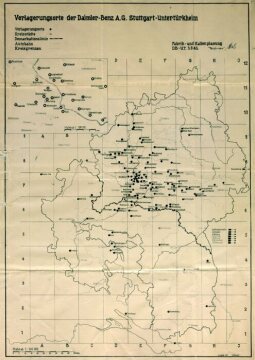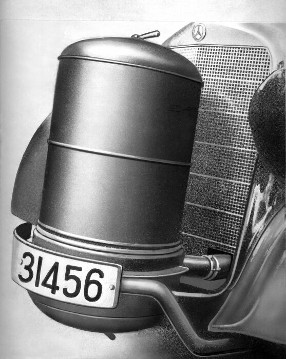1943
Download
Please wait a moment ...
Download
Please wait a moment ...
Delete
Do you really want to delete the data record?
Download
Please wait a moment ...
Download
Please wait a moment ...
Download
Please wait a moment ...
Crop for shopping cart
Please wait a moment ...
Set as main picture
Do you want to set this media object as main picture?


-
29 April 1943
-
With the consent of the Supervisory Board, the Board of Management of Daimler-Benz AG decides to increase the share capital by 30 million Reichsmarks (RM) to RM 120 million by issuing new common shares. The shares are entitled to dividends as of financial year 1943 and are offered to the holders of the old shares at a subscription ratio of 1 for 3 and a price of 130 %. The Annual Shareholders' Meeting on 8 June approves the distribution of a dividend of 6 % on RM 90 million in common shares for financial year 1942.

-
April 1943
-
The Mercedes-Benz 230 (W 153) with coal-burning generator goes into small-series production. To make up at least partially for the loss of power compared with petrol operation, the 2.6-litre M 159 engine is used instead of the 2.3-litre six-cylinder unit. By January 1944 34 vehicles are completed.

-
August 1943
-
To protect themselves against air attack, the plants of Daimler-Benz AG begin transferring their production facilities to locations outside the endangered conurbations. Untertürkheim alone – it is the first plant to initiate the transfers – is moved to 21 different locations by the end of 1944.

-
15 September 1943
-
Chairman of the Board of Management Dr Wilhelm Haspel issues instructions to move machinery, tools and other fixtures which are not absolutely necessary for production out of the factories, along with documents necessary to maintain and furnish proof of the assets of the corporation. In this connection the Hollerith department and the central and financial accounting units are transferred elsewhere from Untertürkheim.

-
17 September 1943
-
Daimler-Benz introduces a wood gas generator for the 170 V passenger car. It weighs only 70 kg, costs 800 Reichsmarks, can be installed in one day and gives the car a range of 100 to 130 kilometres on one 24 kg load of charcoal. By November 1944 more than 6,400 units are produced at the Gaggenau plant.



Loading





